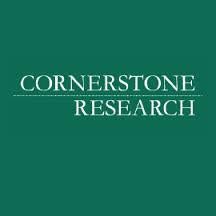The number of merger transactions reported to U.S. government agencies declined in the second quarter of 2020 as the coronavirus pandemic hit the United States. For the first time in the past 10 fiscal years, the number of reported transactions for the third fiscal quarter (April – June) dropped below 270 in the second quarter, according to new analysis by Cornerstone Research.
A decline in reported transactions does not necessarily translate into less enforcement activity. It will be interesting to see if the historic patterns—which would suggest a significant increase in the percentage of transactions investigated—hold for 2020.
Figure 1 shows the number of reported transactions by month for FY 2010, FY 2019, and FY 2020 through June.
The number of transactions reported to the agencies dipped to 79 in April 2020, after a small year-on-year decline in March. While reported transactions were 12% lower in March 2020 compared to March 2019, by April they were down 52% from 2019—dropping below even FY 2010 levels.
The dip continued in May 2020 with only 73 transactions reported to the agencies, a decline of 62% relative to May 2019. In June 2020, the number of reported transactions rose to 111 but was still 31% below June 2019. Figure 2 below charts the year-on-year percentage changes for FY 2020.
Because the number of reported transactions can vary substantially from month to month, it is instructive to compare quarterly totals as well. The decline in reported transactions in Q2 2020 compared to Q2 2019 was particularly sizeable. While the number of reported transactions in Q1 2020 (440) was only 2% lower than Q1 2019, the 263 transactions reported in Q2 2020 were 49% lower than the 515 reported transactions in Q2 2019, and 15% lower than reported transactions in Q2 2010.
“The decline in the number of reported transactions due to the COVID-19 pandemic has been remarkable, especially considering that the number of transactions has generally been increasing since 2013,” said Bob Majure, Cornerstone Research vice president and former Director of Economics for the Antitrust Division of the U.S. Department of Justice. “However, a decline in reported transactions does not necessarily translate into less enforcement activity. It will be interesting to see if the historic patterns—which would suggest a significant increase in the percentage of transactions investigated—hold for 2020.”
Figure 3 shows the percentage of transactions receiving second requests against the number of transactions reported to the agencies and the number of second requests for fiscal years 2010 through 2019 based on data from Cornerstone Research’s report Trends in Merger Investigations and Enforcement at the U.S. Antitrust Agencies and the latest HSR Annual Report.1
As shown, because the number of second requests has remained steady over time, the percentage of transactions receiving second requests exceeded 3% before FY 2015 when the number of reported transactions was below 1,700, but generally dropped to 3% or lower in later years when there were more than 1,700 reported transactions. To the extent that the number of second requests remains at historical levels, the drop in the number transactions reported to the agencies to date in 2020 would translate into a larger proportion of transactions being scrutinized more closely compared to last year.
Footnotes
1 Cornerstone Research, Trends in Merger Investigations and Enforcement at the U.S. Antitrust Agencies: Fiscal Years 2009–2018 (Fifth Edition), Figures 2 and 3, https://www.cornerstone.com/Publications/Reports/Trends-in-Merger-Investigations-and-Enforcement-2009-2018.pdf; 2019 HSR Annual Report, Appendix A, https://www.ftc.gov/system/files/documents/reports/federal-trade-commission-bureau-competition-department-justice-antitrust-division-hart-scott-rodino/p110014hsrannualreportfy2019.pdf.
2 Federal Trade Commission Bureau of Competition and Department of Justice Antitrust Division, Hart-Scott-Rodino Annual Report: Fiscal Year 2019, July 8, 2020 (“2019 HSR Annual Report”), Appendix B: Table 1, https://www.ftc.gov/system/files/documents/reports/federal-trade-commission-bureau-competition-department-justice-antitrust-division-hart-scott-rodino/p110014hsrannualreportfy2019.pdf; “FTC Approves Fiscal Year 2019 Hart-Scott-Rodino Premerger Notification Report,” Federal Trade Commission, July 8, 2020, https://www.ftc.gov/news-events/press-releases/2020/07/ftc-approves-fiscal-year-2019-hart-scott-rodino-premerger.
3 “Real-Time Transparency for HSR Transaction Numbers,” Federal Trade Commission, July 9, 2020, https://www.ftc.gov/news-events/blogs/competition-matters/2020/07/real-time-transparency-hsr-transaction-numbers. The data are available on the homepage of the Premerger Notification Office. See “Premerger Notification Program: HSR Transactions by Month,” Federal Trade Commission, https://www.ftc.gov/enforcement/premerger-notification-program.
4 Reported transactions figures currently available for FY 2020 may not match monthly totals published in future HSR Annual Reports because the agencies adjust the numbers to eliminate transactions that were not reportable, incomplete, withdrawn, or that relate to noncompetitive notifications under the HSR Act. To the extent that the number of withdrawn transactions turns out to be larger in 2020 than in prior fiscal years, the difference between current figures and figures published in future HSR Annual Reports would be larger than in prior fiscal years, and the actual drop in reported transactions would be larger than what it currently appears. See “Real-Time Transparency for HSR Transaction Numbers,” Federal Trade Commission, July 9, 2020, https://www.ftc.gov/news-events/blogs/competition-matters/2020/07/real-time-transparency-hsr-transaction-numbers.




 />i
/>i

